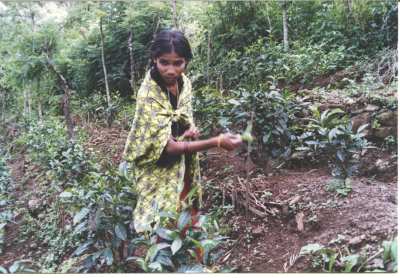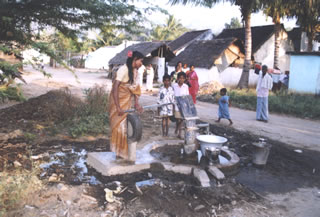VEDS Development Programs
VEDS provides support through programs intended to develop people and communities to healthy self-reliance.
Helping People
Self-Help Groups
VEDS helps make real change by engaging with the people of the community, through organizations called Self-Helf Groups (SHG). A typical SHG consists of 25-30 women working to improve the socio-economic conditions of the villages. The other programs are implemented through these SHGs, empowering all the beneficiaries but particularly women.
VEDS has facillitated the formation of 370 SHGs in 20 villages, to date.
Formal Education
VEDs supports deserving young girls and boys who would otherwise be unable to pursue the education leading to a degree program. Instead of dropping out, these youths are now able to get jobs and support their own families. VEDS is able to fund a three-year degree program for only $1800 dollars, or $600 a year.
Adult Education
Illiteracy is a major obstacle towards self-reliance. VEDS as developed literacy programs for people from 15 to 35. There are 2500 people enrolled at 80 centers across the districts VEDS services.

Vocational Training
Vocational Training provides options to the unemployed and underemployed rural youth. The VEDS program caters to those who did not develop technical skills through a formal education program, and to youths who discontinued their education.
VEDS has reached out to almost 500 youths so far, teaching them skills including:
- Tailoring & Embroidery
- Keyboarding
- Electric Works
- TV & Radio Repair
More than 65% of the trainees are now self-employed and have improved their socio-economic conditions.

Women in Development
VEDS has several programs that focus on improving women's lives within the community. Women are invariably represented at the grass-roots level committees, and play a significant leadership role in mobilizing local resources. Women receive training in various income-generating programs including rearing livestock (cows, pigs and goats); basket weaving, dairy cooperatives, and book-keeping, as well as others.
Women's Rights Education
A major problem in the villages is that disadvantaged women are unaware of their rights and privileges. As a result, they are not treated fairly when it comes to property settlements, inheritances and marriages. VEDS has been organizing legal education programs and legal-aid camps to make these women aware of their rights and privileges, and has reached out to over 5300 women so far.
Health & Sanitation
VEDS has three programs aimed at improving the physical well-being of the rural poor.
Women within the Self-Help Groups are given training in health awareness; cultivation and use of herbal medicine; and preparation of food that is inexpensive but still nutritious.
More formal care is provided by a trained nurse in health clinics. The nurse brings more formal first-aid, immunizations, midwifery, and treatment of simple ailments to the villagers. Also, the clinic maintains all health records which are useful for follow-up visits by government health officials.
A critical health care issue here, as in other geographies, has been the spread of AIDS. The disease is rampant among the illiterate, adolescent boys and girls, widows, and construction workers. VEDS has organized a series of AIDS awareness training programs, health camps, and seminars in the villages using audio-visual aids to educate the villagers on how to prevent the spread of AIDS and to motivate them to want to do so.
Disaster Rehabilitation
Every year, the rural poor are threatened by natural calamities arising from the monsoon season. Torrential rains wash away houses, destroy crops and kill many villagers. VEDS provides emergency relief measures to the stricken, and works to rehabilitate the victims.
Building Communities
 Housing
Housing

VEDS can provide a permanent dwelling for a family of five for only $1500 (Cdn), with a concrete floor, brick walls and tiled roof. Each 30m2 (270 sqft) house has three rooms, a kitchen, bathing room and latrine.
Environmental Management
Arable land is a scarce resource, which requires special technologies to increase agricultural productivity. A number of ecologically-sound programs are being implemented by small-scale farmers that VEDS has trained. The programs include:
- Wasteland Reclamation
- Water Harvesting
- Crop Rotation
- Organic Gardening
- Bio-gas production
- Pollution Management
- Erosion Management
- Overgrazing controls
- Social Forestry
In addition, VEDs works to obtain high-yield seed varieties to improve the productivity of the land.

Agriculture
Marginal farmers face the greatest challenges to their farming from severe water shortages. They are forced to quit farming, which reduces the financial health of the entire village. VEDS works with the farmers, helping them to obtain financial assitance. With financing they are able to deepen their wells, securing needed water for irrigation.
VEDS also assists these farmers past the threshold of sustainability by maintaining a seed bank of high-yield seed varieties. Over 200 farms have benefited from increased productivity and yield.
Large areas of land remain unproductive due to poor irrigation, soil erosion and general nutrient depletion, aggravating the problem of marginal farms in the villages. VEDS has helped to reclaim over 40 acres of such wasteland, converting it into arable land, a source of jobs and nourishment for the
people.

Deforestation has played a major role in a decrease in average rainfall, becoming an unexpected contributor to the problems of the marginal farmers.
VEDS helps villagers overcome this by encouraging social forestry programs. VEDS helps to distribute seedlings obtained from the Department of Lands and Forests.
Over the past few years, these villagers have planted 10,000 teak seedlings, 5000 coconut seedlings and 20,000 fruit seedlings. The program contributes longer term economic benefits as well as the more immediate environmental benefits.

Drinking Water
Access to potable water is a fundamental human need, yet during the summer months drinking water becomes so scarce that women have to travel kilometers to find water for their households.
VEDS has addressed the challenge in two ways. First, over 60 bore wells have been constructed for the various villages. Second, 50 percolation tanks have been constructed. The percolation tanks are used to harvest rainwater during the moonsoon season rains. The reservoir of water then serves during the dry season, for household use and also for agricultural irrigation.
Credit Unions
In many villages, the poor do not have easy access to existing banks or other financial institutions. Lack of alternatives leads these villagers, often women, to borrow from village moneylenders or landlords. The exorbitant interest rates lead many of those borrowers to bankruptcy.
VEDS has created over 95 Credit Unions, managed by the Self-Help groups. Members can can borrow needed funds and a lower and controlled interest rate from the credit union, towards emergency needs or as investment in the creation of new income-generating activities.